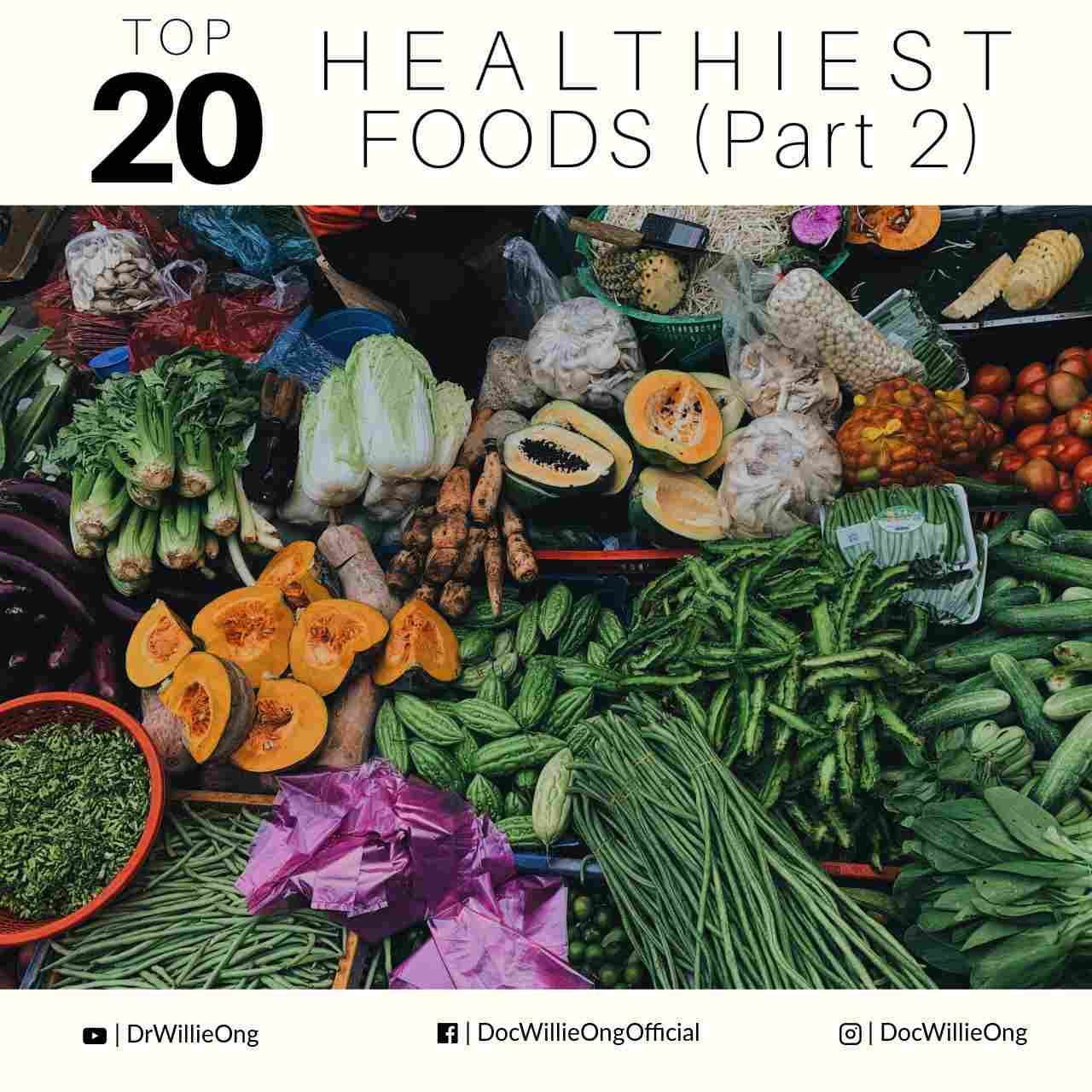By Dr. Willie Ong
Are you eating healthy? Do your daily meals include many of the foods in our list? To recap, here’s our previous list from number 20 down to 11: (20) nuts, (19) coconuts including virgin coconut oil, (18) tea, (17) soy products, (16) wheat, (15) sweet potatoes, (14) oats, (13) ginger, (12) beans, and (11) bitter gourd (ampalaya).
Let’s continue our countdown for the healthiest foods:
Water
Water is one of the most powerful and readily available forms of treatment. Our bodies are composed of mostly water. So how come most people don’t drink enough water?
Lack of water intake can cause kidney stones, infections, migraine, constipation and heatstroke. During hot weather, drink up to 12 glasses a day and at least 8 glasses during colder months. Adequate water also prevents premature ageing and wrinkles.
Mineral water is rich in calcium, magnesium and sodium. Distilled water has no sodium, which is ideal for those with high blood pressure and stone formers. Make sure your water is safe and clean.
Apples
In any survey for the healthiest fruit, apples are on top of the list. Mayo Clinic ranks apples as one of the world’s healthiest fruits. Apples are an excellent source of pectin, which is a soluble fiber that can lower blood cholesterol and sugar levels. Pectin also binds with heavy metals like lead and mercury and helps the body eliminate these pollutants. Fresh apples are also good sources of vitamin C, an antioxidant that protects your body cells from damage.
Apples can help prevent constipation, arthritis, gout, gastroenteritis and diarrhea. Apples are excellent diet foods. Only 47 calories per apple. Even the smell of an apple has a calming effect.
Garlic
The substance that makes garlic smell bad is precisely what makes it so good. The odor comes from sulfur-based compounds known as allyl sulfides. Scientists agree that allyl sulfides and other phytochemicals in garlic may help protect the heart and improve circulation. Although not as potent as prescription drugs, two or three cloves of garlic can help reduce cholesterol levels and can make the blood less sticky. It also has antibacterial and antifungal properties. To release garlic’s potent compounds, you need to mash or mince it.
The bad: Cooking garlic at high heat for a long time may destroy its beneficial effects. However, raw garlic can irritate the lining of sensitive stomachs. Patients with gastritis and ulcer are advised to take caution.
Milk and milk products
The late Dr. Saturnino Ador-Dionisio describes milk as the perfect and complete food – carbohydrates, proteins and fats all in one. Milk is teeming with calcium, protein, vitamin B2 (riboflavin), vitamin B12, vitamin A and zinc. It’s perfect for growing kids and desirable for preventing osteoporosis in menopausal women. One study detected less cancers among those drinking low-fat milk.
Yoghurt is made from fermented milk and contains beneficial bacteria for the gut. Those taking antibiotics are advised to take yoghurt, to replace the healthy bacteria destroyed by the antibiotic.
Cheese is also a milk product. It’s high in zinc, which is vital for normal sexual function in guys.
Bananas
The banana is nature’s wonder fruit and the perfect fast food. Why is this fruit so healthy? Because it’s rich in potassium, vitamin B6 and folic acid. Have you seen Roger Federer eat a banana between games? The high potassium content prevents cramps and gives ready energy with its easily digestible starch. Its potassium content is also perfect for patients on water pills (diuretics), those with heart disease and high blood pressure.
A medium-sized banana has 95 calories, more than an apple but less than a mango. Bananas are also the perfect antacid, coating the stomach and preventing stomach ulcers. The high vitamin B6 also helps women suffering from premenstrual syndrome. The doctor-recommended BRAT diet for patients with diarrhea stands for banana, rice, apple and tea.
Carrots
are extremely healthy and nutritious vegetables. Carrots’ deep orange color means it’s abundant in beta-carotene (one of the main sources of Vitamin A), an antioxidant which helps your vision and immune system. Carrots also have ample amounts of other anti-oxidants like Vitamin C and E. Some believe carrots can delay ageing, protecting the skin from ultraviolet light and preventing wrinkles. In 20 published studies, more than half showed that carrots may reduce cancer risk, including lung cancer. It’s not definite yet but carrots may help.
It is a naturally fat-free and have very few calories, only 35 calories per half-cup serving.
Citrus fruits like calamansi, suha (pomelo), dalandan
The overflowing amounts of vitamin C in citrus fruits is the reason for its high ranking. Locally we have calamansi, suha and dalandan. However, oranges and lemons are splendid too but are more costly. Vitamin C may alleviate inflammatory conditions like asthma, osteoarthritis and rheumatoid arthritis. It also protects the heart and boosts the immune system. That’s why it’s good for preventing colds.
Citrus fruits contain a fair amount of folate and potassium. Folate lowers homocysteine levels in the body and may reduce heart disease. The potassium in citrus fruits helps to lower blood pressure too.
Tomatoes
Fresh tomatoes and those found in ketchup and sauces may reduce the risk for heart disease, prostate cancer and other cancers of the digestive tract. Tomatoes are extremely high in antioxidants, especially carotenoids like beta-carotene and lycopene.
Lycopene
is considered the most powerful antioxidant among the carotenoids, the compound that turn fruits and vegetables orange-red. Lycopene does its miracle work by removing the evil free radicals from our body. Lycopene is readily released by cooking tomatoes and it’s most easily absorbed with a little oil added.
Oily fish
Backed by strong scientific evidence, oily fish like sardines, tuna, mackerel and salmon are filled with healthy omega-3 fatty acids — a type of fat that makes your blood less likely to form clots. For milkfish (bangus) lovers, our favorite fish has lesser amounts of omega-3 but still okay.
Omega-3 in oily fish may prevent sudden death, reduce triglyceride levels, lower blood pressure and reduce the risk of stroke. Researchers suspect that omega-3 may block the production of inflammatory substances causing rheumatoid arthritis and lupus. Even more encouraging are studies that suggest that omega-3 may protect brain cells from Alzheimer’s disease.
Dark green leafy vegetables
Vegetables contain vitamins, minerals and thousands of other plant chemicals known to provide health benefits. Lettuce, cabbage, spinach and broccoli are all very healthy. Green leafy vegetables contain varying amounts of fiber, potassium, calcium, folate, iron and vitamins A, B and C.
Here are just a few of the diseases it can help: heart disease, high cholesterol, high blood pressure, type 2 diabetes, bowel problems, irritable bowel syndrome, various cancers of the bowel (mouth, stomach and colon cancers), kidney stones and many more. Eating vegetables can also fight obesity. Vegetables are excellent filler foods because they’re low in fat, low in calories and high in fiber. Therefore, eat your vegetables today.



